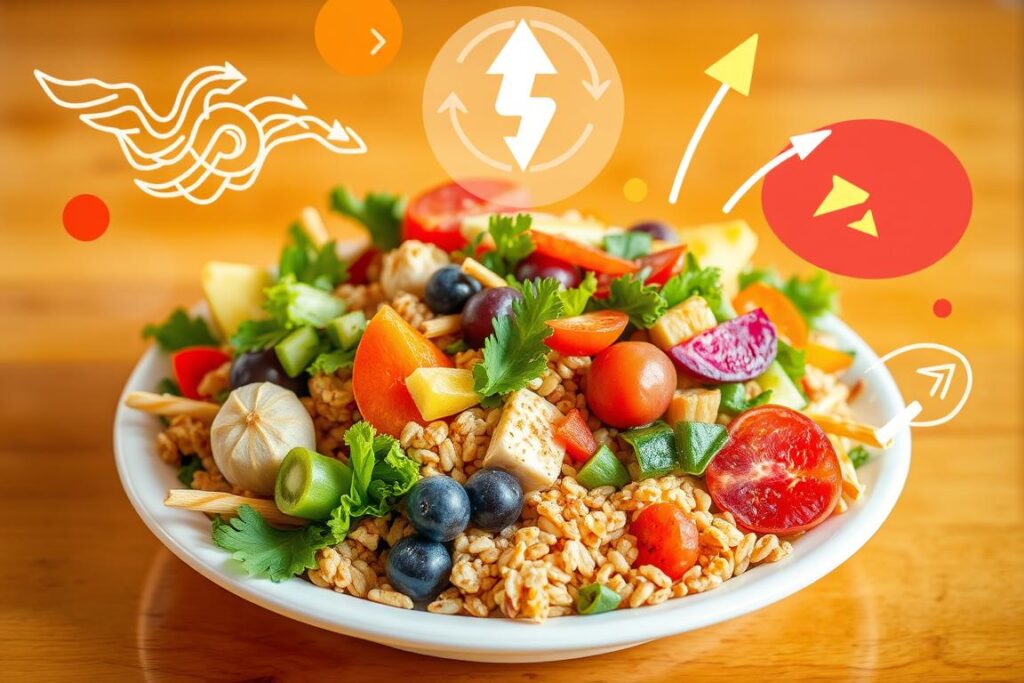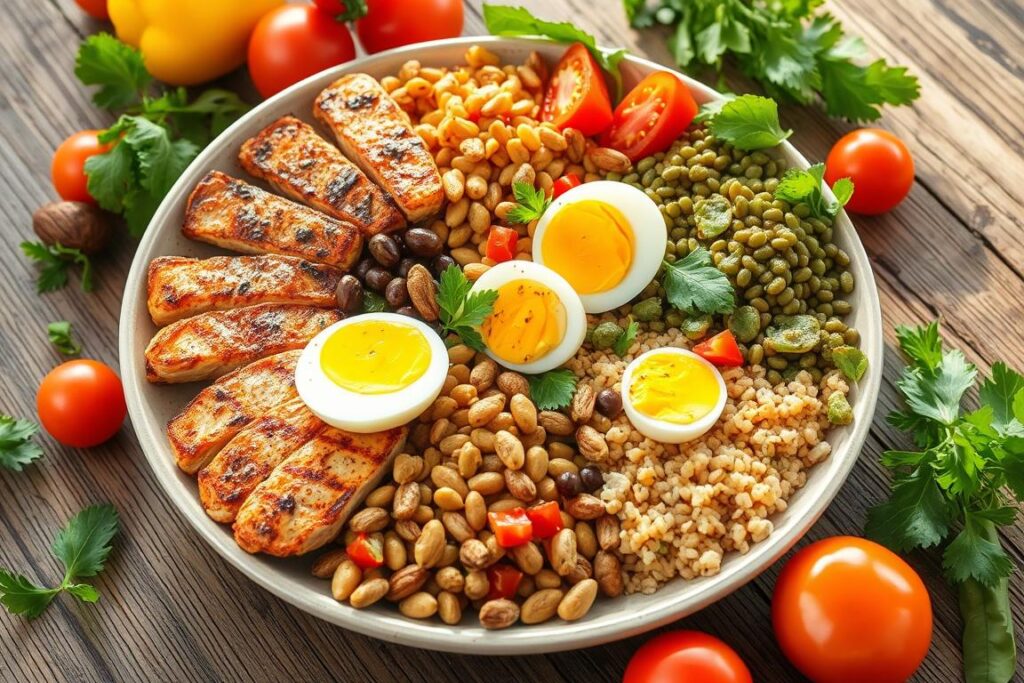Have you ever wondered how to increase the metabolism eating more? The answer lies in the body's process of converting food in energy. The metabolism is the process by which the body burns calories to live. The metabolic rate is the speed at which this happens.
THE food is crucial to control the metabolic rate. By eating right, it is possible to speed up the metabolism. This means choosing food rich in nutrients.
With a balanced diet, it is possible to increase metabolic rate. This improves overall health. Food rich in proteins, such as meats and legumes, can increase metabolism by 15% to 20%.
Drinking green tea and cold water also helps. But how does it work? And what foods and practices can increase metabolic rate?
The answer to these questions lies in the way the body regulates metabolism. This is influenced by food, exercises and lifestyle. In this section, we will show you how to increase your metabolic rate.
We will give tips on food, exercises and lifestyle. This will help in weight loss and improving general health.
What is metabolism and how does it work?
Metabolism is the process by which the body burns calories to live and function well. Metabolic rate varies depending on diet, exercises and lifestyle.
THE food is crucial for metabolism. It provides the calories and nutrients the body needs. exercises are also important. They help increase metabolic rate and burn calories.
Basic definition of metabolism
Metabolism is a complex process. It involves the breakdown and synthesis of molecules to produce energy. The basal metabolic rate is the amount of calories the body burns when it is at rest.
Factors influencing metabolic rate
Some factors that affect metabolic rate include:
- Age
- Sex
- Weight
- Height
- Physical activity level

The relationship between nutrition and metabolism
Food is essential for metabolism. It provides the calories and nutrients your body needs. A balanced and healthy diet helps maintain a healthy metabolism.
| Factors | Influence on metabolism |
|---|---|
| Food | Provide calories and nutrients |
| Exercises | Increase metabolic rate |
| Age | Reduce metabolic rate with advancing age |
How to speed up your metabolism by eating more: fundamental principles
According to experts, food plays a crucial role in the speed of metabolism. A balanced diet, full of nutrients, can increase the metabolic rate. It is vital to recognize that what we eat affects our metabolism. A well-planned diet helps in weight loss.
To increase calorie burning, it is essential to include certain foods in your diet. For example:
- Proteins lean, like chicken and fish
- Complex carbohydrates, such as fruits and vegetables
- Good fats, such as nuts and seeds
Drinking plenty of water is also important. Dehydration can decrease the efficiency of your metabolism. Drinking more water directly improves metabolism. One study showed that drinking 500 ml of water can increase metabolism by 24% in 60 minutes.

Divide the meals in six parts can speed up your metabolism. This can help you lose up to 2 pounds per month. Swapping fat for muscle also increases calorie burning. More muscle means more calorie expenditure.
| Food | Effect on Metabolism |
|---|---|
| Proteins thin | Increase metabolic rate |
| Complex carbohydrates | Provides energy to the body |
| Good fats | Helps reduce inflammation |
To speed up your metabolism, it is crucial to have a balanced, nutrient-rich diet. It is also important to eat frequently. Exercise and water are essential to maintain a healthy metabolism and help weight loss.
The Science Behind Boosting Your Metabolism
To speed up metabolism, it is crucial to understand the role of proteins, complex carbohydrates and good fats. Studies show that these nutrients are essential for a healthy metabolism. Protein helps build and repair tissues, while complex carbohydrates provide energy. Good fats, in turn, reduce inflammation.
The role of proteins
Proteins are essential for metabolism. They help build and repair body tissues. They also control appetite and keep you feeling full. Including lean proteins, such as chicken and legumes, in your diet is important.
Importance of complex carbohydrates
Complex carbohydrates, such as whole grains and fruits, are rich in fiber. They provide energy to the body and improve the health of the gastrointestinal tract. They also help reduce inflammation and insulin sensitivity.
Good fats and their metabolic impact
Good fats, such as those found in nuts and avocados, are rich in nutrients. They reduce inflammation and improve heart health. Including good fats in your diet is essential for a healthy metabolism.
To speed up your metabolism, it is vital to have a balanced diet. Visit the website portalpop.com.br for more information on foods that speed up your metabolism. They help maintain a healthy waistline.
Metabolism is influenced by genetics, lifestyle and age. However, a balanced diet can maintain a healthy metabolism. This reduces the risk of chronic diseases.
| Food | Benefit |
|---|---|
| Lean proteins | They help build and repair the body's tissues |
| Complex carbohydrates | They provide energy and help maintain the health of the gastrointestinal tract |
| Good fats | Help reduce inflammation and improve heart health |
Foods that naturally speed up metabolism
Some foods can speed up the metabolism effortlessly. Coffee, green tea, ginger and red pepper are examples. They have properties that can increase the metabolic rate, helping in weight loss.
See the foods that help burn calories:
- Coffee: increases metabolic rate by up to 11%
- Green tea: burns up to 80 calories per day
- Ginger: increases thermogenesis and calorie burning
- Red pepper: increases thermogenesis by up to 50%
Foods rich in protein and calcium are also beneficial. Almonds and yogurt are good examples. They help speed up the metabolism and promote the weight loss. Including them in your diet is essential to improve your metabolic rate.
For best results, combine these foods with a balanced diet. It is also important to exercise regularly and get enough sleep. This will speed up the metabolism and reaches the weight loss in a natural and healthy way.
| Food | Property | Effect on metabolism |
|---|---|---|
| Coffee | Caffeine | Increases metabolic rate by up to 11% |
| Green Tea | Catechins | Burn up to 80 calories per day |
| Ginger | Thermogenesis | Increases thermogenesis and calorie burning |
| Red pepper | Capsaicin | Increases thermogenesis by up to 50% |
Meal times and frequency
The frequency and timing of meals affect the metabolism. Studies show that eating smaller portions helps control glucose and insulin. Low-calorie but healthy foods reduce hunger and increase fat burning.
To maintain the metabolism well, it's good to have three meals main meals and two snacks. A light meal in the evening, such as broth or fruit, helps if you feel hungry.
The power of small meals
Eating every three hours maintains energy expenditure. This can be done with meals main and healthy snacks, such as fruits and vegetables.
Intermittent fasting: benefits and risks
THE intermittent fasting It can reduce inflammation and improve insulin. However, it can cause muscle loss and decrease metabolic rate. It is essential to speak to a nutritionist before starting.
Ideal meal planning
Plan the meals should consider each person's needs. It is good to eat three fruits and three to five vegetables per day. Include proteins and healthy fats in your diet. meals is also important.
Food combinations to boost metabolism
According to the web, certain food combinations can speed up your metabolism. For example, mixing proteins and complex carbohydrates is beneficial. This is found in chicken, fish, eggs, and legumes.
Other combinations that help include:
- Avocado and eggs: Avocado reduces hormones that cause fat to increase. Eggs, rich in protein, help build muscle.
- Almonds and fruits: Almonds have good fats and magnesium, which help burn fat. Fruits are full of vitamins and minerals that keep the body healthy.
- Tuna and broccoli: Tuna improves glucose metabolism and stimulates satiety. Broccoli, rich in vitamin C and calcium, helps burn fat.
These combinations can speed up metabolism and help with weight loss healthy. Remember that the best combination varies for each person. It is always best to consult a nutritionist for personalized guidance.
| Food | Benefit | Recommendation |
|---|---|---|
| Avocado | Monounsaturated fats | 1-2 servings per day |
| Almonds | Good fats and magnesium | 1/4 cup per day |
| Tuna | Omega 3 | 2-3 servings per week |
Exercise and its relationship with food metabolism
Exercise is essential for metabolism. It helps to increase the metabolic rate. In addition, nutrition before and after training is crucial for better results.
Increasing muscle mass is very important. Muscles burn fat and generate energy.
Some exercises are more effective at increasing your metabolic rate. For example:
- Strength exercises, which help increase muscle mass
- High-intensity exercise, which can increase the production of proteins related to mitochondria and muscle contraction
What you eat before and after your workout is also important. Protein-rich foods like meat, chicken, and fish can help increase your metabolic rate. Drinking water can also increase your metabolic rate by up to 30% for 30-40 minutes after drinking.
To summarize, exercise and proper nutrition are essential to improving your metabolism. Include strength and high-intensity exercises in your routine. And eat foods rich in protein and fiber. This will increase your metabolic rate and improve your overall health.
Common mistakes when trying to speed up metabolism
Many people make mistakes when trying to speed up their metabolism. One of them is not having a meal plan. Another is not exercising regularly, which can lead to unhealthy weight loss.
Another common mistake is to cut out too many carbohydrates. This can decrease your desire to exercise. It is also a mistake to not eat enough protein. Protein is essential for maintaining muscle mass and, therefore, metabolism.
To avoid these mistakes, it is crucial to have a well-thought-out action plan. This should include a balanced diet and regular exercise. It is also important to know what mistakes can prevent healthy weight loss.
- The importance of a balanced and varied diet
- The need for regular and adequate exercise
- The importance of avoiding excessive carbohydrate restriction and inadequate protein intake
By following these tips and with a well-designed plan, you can increase your metabolism. This way, you can achieve healthy and lasting weight loss.
Conclusion
We have reached the end of this journey on metabolism and food. We saw that the metabolism is complex and influenced by several factors. A balanced diet is crucial to losing weight in a healthy way.
Adding more protein, complex carbohydrates, and healthy fats to your diet helps. Regular exercise also increases your metabolic rate. Avoid overly restrictive diets, as they can cause muscle loss and decrease your metabolism.
Every person has a metabolism unique. Therefore, it is important to have patience and perseverance. A balanced diet, adequate hydration and rest are essential for a metabolism healthy.


